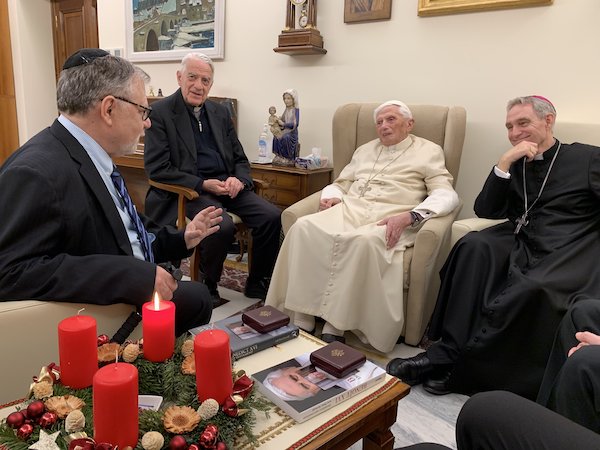
PROSPECT HEIGHTS — Bishop Robert Brennan of Brooklyn has asked the diocese to join him in prayer for the repose of the soul of Pope Emeritus Benedict XVI, remembering him as an intellectual and holy man who “deeply loved God and served the Church generously throughout his whole life.”
Pope Benedict XVI died early Saturday morning. He was 95.
“[Pope Benedict] made tremendous contributions to the Second Vatican Council as a priest and theologian,” Bishop Brennan said in a statement. “Many of his contributions made their way into the documents of the council, which charted the course for the Church in the modern era.
“Pope Benedict XVI had a great mind, and his books have inspired me,” said Bishop Brennan, who was named an auxiliary bishop for the Diocese of Rockville Centre by Pope Benedict on June 8, 2012. “He was a great teacher who helped us to understand and live our faith more profoundly.
“On a personal note, ten years ago, in 2012, he appointed me an auxiliary bishop for the Diocese of Rockville Centre. Later that year, he received the newly ordained bishops,” Bishop Brennan noted. “There was a genuine kindness and gentleness about him. He gave us his full attention and encouraged us in our ministry as bishops.”
As the news made its way stateside early Saturday morning, Church and lay leaders across the nation offered prayers for Pope Benedict and reflected on his legacy of serving the church for more than 70 years, many of which were in a leadership capacity.
In 1977, St. Paul VI named Pope Benedict the archbishop of Munich and Freising. Four years later, St. Pope John Paul II called him to lead the Congregation for the Doctrine of the Faith, a position he held for more than two decades, before being elected pope in 2005. Eight years later, Pope Benedict resigned from the role, becoming the first pope to do so in nearly 600 years.
In a statement, Archbishop Timothy Broglio, president of the United States Conference of Catholic Bishops, described Pope Benedict as a “superb theologian” and “effective teacher of the faith.”
“As a priest, university professor and theologian, archbishop, and cardinal, his voice in deepening an authentic understanding led all of us to a more profound love of truth and the mystery of God,” said Archbishop Broglio, head of the U.S. military archdiocese. “It will take many years for us to delve more deeply into the wealth of learning that he has left us.”
Archbishop Broglio also highlighted Pope Benedict’s decision to resign, and the decision “continued his teaching about courage, humility, and love for the Church.”
“He recognized the great demands made of him as the chief shepherd of the Universal Church of a billion Catholics worldwide and his physical limitations for such a monumental task,” said Archbishop Broglio. “Even in retirement, retreating to live out a life in quiet prayer and study, he continued to teach us how to be a true disciple of Christ while still contributing to his legacy.”
“Generations will continue to be enriched by his books, discourses, and homilies. They all reveal a depth of learning and reflection that is essential both in our time and in the future,” he added.
Cardinal Timothy Dolan of New York said in a statement that the “human family grieves the passing of this erudite, wise, and holy man, who spoke truth with love.”
Cardinal Seán O’Malley of Boston called Pope Benedict’s commitment to maintaining the truth and clarity of the Catholic faith, cultivating ecumenical and interfaith dialogue, and reaching out to inspire the next generation of Catholics “great gifts to us all.”
In a statement, Cardinal O’Malley, who has been a leader in addressing the clergy sexual abuse crisis, also reflected on Pope Benedict’s pastoral visit to the United States in 2008, where he became the first pontiff to meet with and apologize to clergy sex abuse survivors. Cardinal O’Malley was present at the meeting and remembers Pope Benedict’s “deep pastoral care” for the survivors.
“Pope Benedict XVI recognized the pain experienced by survivors and all persons impacted by the abuse crisis,” Cardinal O’Malley said. “He was then, and at all times remained, committed to the Church supporting their journey towards healing and doing all that was possible to ensure the protection of children, young people, and vulnerable adults.”
Cardinal Blase Cupich of Chicago, in a statement, noted that Pope Benedict was the last pope to attend the Second Vatican Council, and with that, “served as a bridge to the future, reminding us all that the reform and renewal of the Church is ongoing.”
President Joe Biden also weighed in on Pope Benedict’s death, saying in a statement through the U.S. Ambassador to the Holy See Joe Donnelly, that “Jill and I join Pope Francis and all the Catholic faithful around the world in mourning the loss of Pope Emeritus Benedict XVI. Pope Emeritus Benedict ascended the papacy with great courage and conviction as the world mourned the death of Pope Saint John Paul II.”
